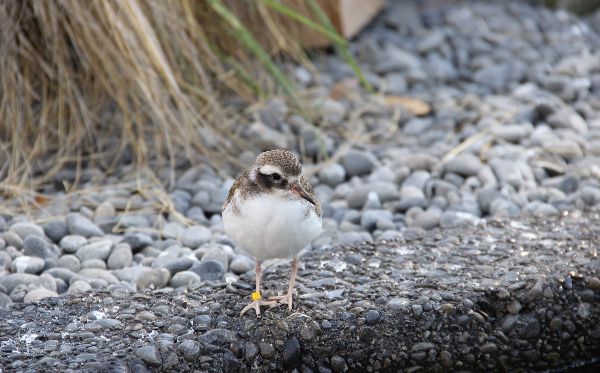Endangered Birds Set Course For New Home
Nine juvenile tūturuatu / tchūriwat’ / shore plover were translocated to Portland (Waikawa) Island earlier this month as part of ongoing efforts to preserve this rare and threatened species, thanks to ongoing efforts by the Department of Conservation with financial support from the New Zealand Nature Fund.

Hatched in January and raised at the Isaac Conservation and Wildlife Trust in Christchurch, the birds were flown to Napier on 5 May and escorted to the motu.
Shore plover are small, quirky shorebirds unique to New Zealand, with distinctive dark caps on their heads. Their tendency to nest on the ground, as well as their territorial nature, makes them highly susceptible to introduced predators like rats, stoats, and cats. Their survival relies on captive breeding, translocations to predator-free islands, and island biosecurity.
With only around 250 individual birds in the world, they have the highest possible threat ranking of Threatened: Nationally Critical.
Other tūturuatu / shore plover populations exist on South East (Rangatira) / Hokorereoro and Mangere Island / Maung’ Rē Islands in Rēkohu / Wharekauri / Chatham Islands, and Motutapu in the Hauraki Gulf / Tīkapa Moana.
The translocation was made possible through ongoing partnerships with the New Zealand Nature Fund, the Isaac Conservation and Wildlife Trust, and Air New Zealand.
Six of the nine juvenile birds (two male, seven female) have parents hatched from the wild eggs translocated from Rangatira / Hokorereoro Island in 2020, so this translocation will add a welcome genetic boost to the Waikawa motu.
Dave Houston, Shore Plover Recovery Programme Lead and Technical Advisor Ecology for DOC, says that the efforts of the Recovery Group are paying off.
“Isaac’s have been a key partner with shore plover recovery for the last 18 years,” says Dave, “and we’re extremely grateful for their ongoing support. The shore plover recovery really is a prime example of conservation being a long game.
“The birds underwent a health and safety check on arrival to make sure they were not injured in transit. They were settled into the pre-release aviary, where they spent seven days acclimatising to the motu before being released into the wild.
“Even with the many challenges associated with this work, and a few setbacks along the way, successes like these are well worth celebrating.”


 Gordon Campbell: On Why We Can’t Survive Two More Years Of This
Gordon Campbell: On Why We Can’t Survive Two More Years Of This NZ Government: Drive Safely This Summer
NZ Government: Drive Safely This Summer Northland Inc: Game-Changing Investment For Northland - Resilience Fund Allocates $250,000 To Health Simulation & Training Centre
Northland Inc: Game-Changing Investment For Northland - Resilience Fund Allocates $250,000 To Health Simulation & Training Centre Interchurch Bioethics Council: Church Bioethics Agencies Express Dismay at the Rushed Consultation Period for Submissions on the Gene Technology Bill
Interchurch Bioethics Council: Church Bioethics Agencies Express Dismay at the Rushed Consultation Period for Submissions on the Gene Technology Bill New Zealand Police: More Than $2.5m Worth Of Assets Restrained In Undeclared Tobacco Case
New Zealand Police: More Than $2.5m Worth Of Assets Restrained In Undeclared Tobacco Case SPCA: Survey Shows Government Lacks Mandate To Repeal Live Export Ban
SPCA: Survey Shows Government Lacks Mandate To Repeal Live Export Ban Peace Action Ōtautahi: Bridge Of Remembrance Peace Protest
Peace Action Ōtautahi: Bridge Of Remembrance Peace Protest


